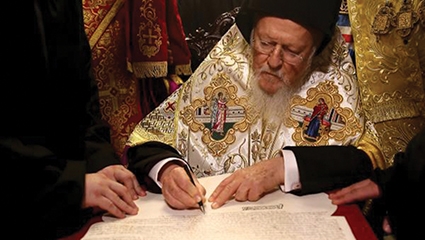Will Georgia Come out against Ukraine?
Op-Ed
The Ukrainian Orthodox Church has been granted the Tomos, that is the decree of autocephaly, or independence. On January 6, one day before Orthodox Christmas, Ecumenical Patriarch Bartholomew I handed the Tomos to leader of the Orthodox Church of Ukraine, Metropolitan Epifaniy (Epiphanius) of Kiev and All Ukraine. The ceremony took place in St. George's Cathedral in Istanbul.
The Tomos, meaning “decree” in Greek, clearly states that from now on Ukraine’s Church is autocephalous. It is under the direct patronage of the Ecumenical Patriarchate of Constantinople, which also serves as the Supreme Institution of Appeals for it. Before that, for almost 300 years, Ukraine’s Church was part of the Russian Patriarchate and Moscow, and its chief canonical juror was the Patriarch of Russia.
Apart from a parish of 40 million, Moscow’s Patriarchate also owned three Lavras (among them part of the Kiev-Pecheri Lavra), 168 monasteries and 13,348 cathedrals. For the sake of comparison, note that on the territory of Russia, the Patriarchate owns two Lavras, 499 monasteries and 18,042 cathedrals.
The loss that the Russian Orthodox Church has seen in Ukraine equals the “fall of the third Rome” for Russia. With the Tomos, Ukraine became the 16th Autocephalous Orthodox Church and its formation has begun a most difficult period – a process of recognition which will be marked with intrigue and problems. The Orthodox world should once and for all answer the question as to whether it recognizes the decision of the World Ecumenical Patriarch about granting Ukraine autocephaly, and if it is ready to mention the leader of the newly formed Ukrainian Church Epiphanes in its prayers.
It has been less than a week since the Tomos was granted and the Orthodox Patriarch of Antioch has already turned against the autocephaly of Ukraine, saying that Bartholomeus did not take into consideration the position of other autocephalous churches when making this decision. The position is shared with the Church of Serbia, with Serbian Patriarch Irinej accusing the Ecumenical Patriarch of “neglecting canonical law.” He commented to Euronews that the decision of Patriarch Bartholomeus was not canonical but political. “In the controversy between Moscow and Constantinople, we will use canonical law, according to which Ukraine’s Church is within the canonical borders of Moscow’s Patriarchate,” said the Patriarch of Serbia.
The remaining Orthodox Churches have yet to share their official position, including the Georgian Orthodox Church. This massive change that took place in the Orthodox world went completely unmentioned in Patriarch Ilia II’s Christmas liturgy. However, after the liturgy, the Patriarch’s locum tenens Shio and one or two other church leaders provided the reason for the lack of comment on the issue and said they “hadn’t read the text of the Tomos yet.” “Who knows what is written in it?” they told reporters. “How can we express our official position without reading it? We need to discuss it during the Synod. We will examine the issue during the following Synod,” said Bishop Nikoloz after the Christmas service.
An interesting position was heard from the Rector of the Theological Seminary, Protopresviter Giorgi Zviadadze. His comment sounded a lot like what the Patriarch of Serbia said about the autocephaly of Ukraine and the decision of Bartholomeus: “Ukraine is the friend of our country and naturally with this attitude we all respect Ukraine, but there is a clear Church Law and in this case the Holy Synod will use only the canonical rules. We are confident that the Holy Synod will make the correct decision and that it will be based on the Church laws that have been adopted during the various Church meetings and recognized as the only and chief rules to be used when making such decisions.”
This clearly implies that the Patriarchate of Georgia may well act like the patriarchates of Serbia and Antioch and not support the autocephaly of Ukraine, thus deciding to continue orbiting around the Russian Church.
There were only 15 Orthodox Churches in the world (Ukraine became the 16th): Constantinople, Alexandria, Antioch, Jerusalem, Russia, Georgia, Serbia, Romania, Bulgaria, Cyprus, Elada, Albania, Poland, Czech-Slovakia, and the USA. In order to defend its position, Russia needs the support of at least eight other churches. As yet, only three have announced support: Antioch, Serbia and Russia. Whether Georgia will join the campaign will become known soon, but we can already say that it is almost there.
By Zaza Jgarkava
Image source: Bartholomew I signs the Tomos of Autocephaly, marking the formal independence of the Ukrainian Orthodox Church at the Patriarchal Church of St. George in Istanbul. ANADOLU AGENCY / GETTY IMAGES












